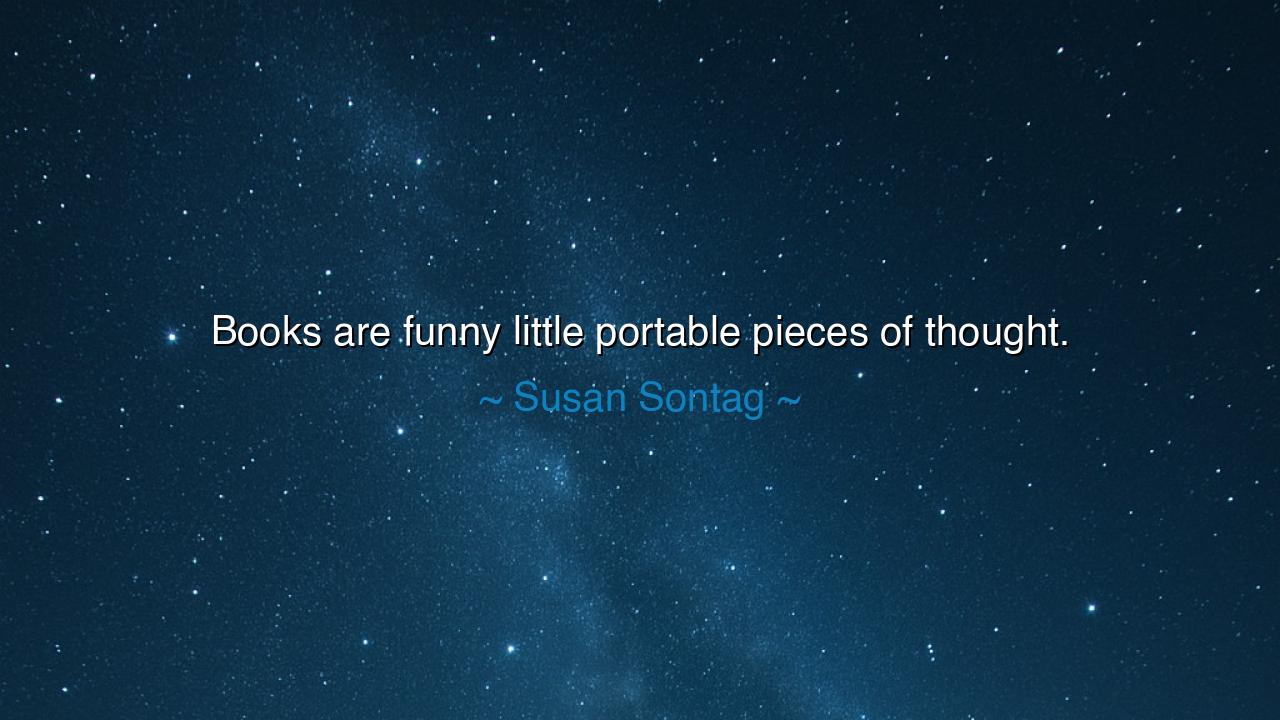
Books are funny little portable pieces of thought.






The writer Susan Sontag, whose mind shone like a torch through the labyrinths of modern thought, once said: “Books are funny little portable pieces of thought.” At first glance, this saying may seem whimsical — a gentle jest from a lover of reading. But beneath its softness lies a revelation profound and ancient: that books are not merely objects of paper and ink, but living vessels — carriers of the human mind, fragments of consciousness folded into pages, eternal companions of those who seek wisdom beyond the walls of their own soul.
To call a book a “piece of thought” is to recognize that every page is the captured breath of a living mind. A book is not wood and glue, nor words alone; it is spirit made tangible. When the writer thinks, imagines, and wrestles with truth, their essence flows into the written line — and when we read, that essence enters us again. Thus, every book is a form of immortality, a bridge between the mortal and the eternal. The funny little form of it — so small, so quiet, so easily carried — belies its immeasurable power. Like a lamp in the desert night, a book is humble in appearance but infinite in reach.
In the time of the ancients, the philosopher Plato spoke of ideas as divine shadows — forms that existed before the world and would outlive it. What Sontag reminds us of is that the book is the vessel that captures those shadows and gives them shape. When one holds a book, one holds not only paper, but the distilled essence of human struggle, love, inquiry, and wonder. A simple bound volume — how portable, how delicate — yet within it resides the weight of centuries. It is as if the mind of the past, whispering across time, rests lightly in the palm of one’s hand.
Think of Alexander the Great, who carried the works of Homer with him on every campaign. In the heat of conquest, he would sit beneath the stars, opening his worn scrolls to read of Achilles — his hero, his mirror. In those moments, he was no longer alone among armies and empires. He was joined by the spirit of another age. Such is the secret of the book — it brings the company of the dead to the living, the wisdom of the ancient to the seeker of today. It is not stone or statue that binds humanity across the ages, but the quiet endurance of thought preserved in words.
The “funny” part of Sontag’s phrase reveals her irony, her affection for the absurd majesty of it all. How strange, indeed, that the vastness of human emotion, the architecture of civilizations, the dreams of prophets and poets — all can fit inside an object that slips into a coat pocket! There is humor in that smallness, and reverence too. The book humbles us: it teaches that greatness need not roar. The most world-changing truths arrive quietly, hidden in paper sleeves, awaiting the eyes of one who is ready to see.
But there is danger in forgetting this. In our time, when light flashes and voices flood the air with noise, we may overlook the slow, silent strength of portable thought. A book demands patience — it asks the reader to dwell, to listen, to commune. To read is to humble oneself before another mind and say: “Teach me. Show me your world.” When we cease to read, we do not only lose knowledge — we lose communion, the sacred exchange between soul and soul.
So, the lesson is this: carry a book as you would carry a charm or a prayer. Treat it not as an object but as a friend. Let it travel with you through the hours of solitude, the long roads, the sleepless nights. Read not to consume, but to awaken. For every book you open is a portable piece of thought — a spark from another’s fire, ready to kindle your own. And as you read, remember this truth: that just as you receive the thoughts of others, so too can your thoughts one day take form, finding a vessel of their own, to journey beyond your years.
Thus, my child, revere the written word. Let your home be filled with the quiet company of books. For in those little pieces of thought lies the endless conversation of humanity — a dialogue that began long before you were born, and will continue long after you are gone. Read deeply, write honestly, and know that in doing so, you are participating in the oldest act of magic: the transformation of thought into eternity.






AAdministratorAdministrator
Welcome, honored guests. Please leave a comment, we will respond soon